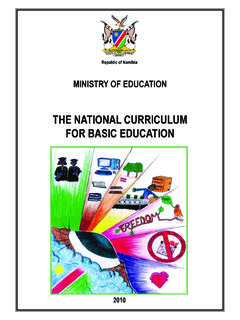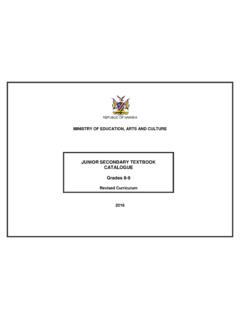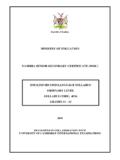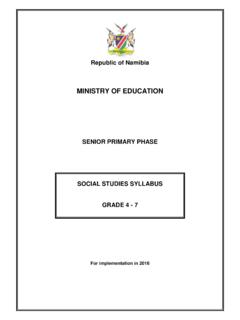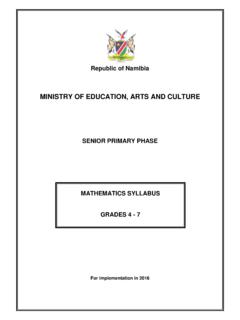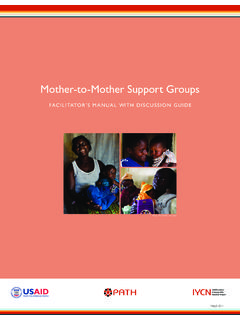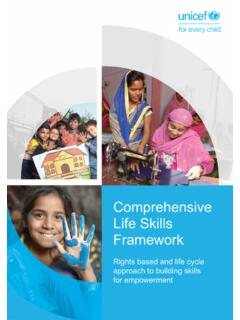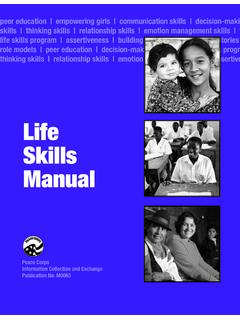Transcription of Life Skills Facilitators Training Manual
1 life Skills Facilitators Training Manual SENIOR PRIMARY PHASE To be used for Training in 2015 Ministry of Education National Institute for Educational Development (NIED) Private Bag 2034 Okahandja Namibia Copyright NIED, Ministry of Education, 2014 life Skills Facilitators Training Manual Grade 4 - 7 ISBN: 978-99945-2-100-5 Printed by NIED Website: Publication date: 2014 PROGRAMME Day One Registration Opening / welcoming remarks Introduction of facilitator and participants; presentation of house rules Background information Tea/coffee break Circle of support to ensure the success of life Skills Alice in Wonderland Ice Breaker Workshop objectives Lunch Energiser Inclusive education Learner-centred education Methodology Day Two Opening; signing of attendance list Recapturing Day One The characteristics of a life Skills teacher Tea/coffee break Planning Lunch Planning (continue) Energiser ( facilitator can use his/her own initiative) Feedback on planning Day Three Opening; signing of attendance list Recapturing Day Two Lesson preparation Tea/coffee break Lesson preparation form Continuous Assessment form Lunch Energiser Lesson presentation and assessment of learners life Skills administration The way forward The life Skills Teacher s Pledge Close1 life Skills Facilitators Training Manual Grade 4 - 7, NIED 2014 life Skills Facilitators Training Manual Slide 1 Notes: The slide is to be displayed while participants are entering the venue.
2 Slide 2 Notes: This slide is about the welcoming remarks. Welcoming remarks could be done by someone from the regional office. Introduction of facilitator and participants. Material: A4 paper and pens Activity: Participants create acrostics of their names using positive adjectives, and introduce themselves to the other participants by reading their acrostic and stating their names. If possible, display the acrostics in the room. Slide 3 Notes: This slide provides the background information about life Skills . Before Independence, life Skills was called Career Guidance and was taught as from Standard 6 (now Grade 8) to Standard 10 (now Grade 12). After Independence, life Skills as a subject was taught from Grade 8 12. In the Senior Primary Phase life Skills was part of the subject Social Studies. From 2006, life Skills became a standalone subject, and is currently taught from Grade 5 12.
3 In 2015, life Skills teachers will receive Training on the revised curriculum. 2 life Skills Facilitators Training Manual Grade 4 - 7, NIED 2014 As from 2016, life Skills will be taught from Grade 4 to 12 as a compulsory support subject. Slide 4 Notes: This slide is about the Circle of support that ensures the success of life Skills . The success of teaching life Skills depends on a circle of support consisting of: The Ministry of Education: head office, regional office, non-governmental Organisations (NGOs). The school board, principal, management and parents have the responsibility to ensure that the subject life Skills is offered at their schools. The regional school counsellors (RSCs) need to assist the principals and life Skills teachers. The RSCs need to ensure that monitoring by the principal or management takes place every term.
4 The life Skills Monitoring and Evaluation form must be sent to the RSC at the end of every term. In the ideal situation schools should have one life Skills teacher that teaches as many of the classes as possible. The life Skills teacher should teach every topic and must have proof of the lessons he/she presented. The life Skills teacher must be actively involved in the lesson, and constantly move amongst the learners to keep the learners involved in the lesson. The full-time life Skills teacher should adhere to the roles and responsibilities as prescribed in the Circular Form ED 06/2012. Learners should be encouraged to take part in every lesson, ask questions, participate in class discussions, and take part in activities. They should be actively involved in the selection of topics for every term. 3 life Skills Facilitators Training Manual Grade 4 - 7, NIED 2014 Slide 5 Notes: This slide is about setting goals and planning.
5 Activities: Brainstorm what the moral of the Alice in Wonderland text could be. Discuss how the text applies to this workshop. Ice Breaker Give each participant a sheet of paper and ask them to close their eyes. Give the following instructions: Do not talk, and keep your eyes closed during the activity Hold the paper in front of you Fold the paper in half Fold the paper in half again Fold the paper in half again Tear off the lower right corner Turn the paper over Again tear off the lower right corner Open your eyes Unfold the paper and hold it up Papers will look different. Discuss with participants how this activity illustrates the differences and similarities between learners. Perceptions and understanding of the same instructions might be different. Discuss with participants how different learning abilities will affect teaching.
6 4 life Skills Facilitators Training Manual Grade 4 - 7, NIED 2014 Slide 6 Notes: This slide is about the workshop objectives. Each life Skills teacher should receive a copy of the syllabus. The facilitator guides the participants through the syllabus. Material: Flipchart paper and markers Activities: Group One: List all sensitive topics to be taught in Grade 4 & 5. Discuss the do s and don ts when teaching sensitive topics. Group Two: List all sensitive topics to be taught in Grade 6 & 7. Discuss the do s and don ts when teaching sensitive topics. Group Three: Discuss similarities in topics across the grades. Group Four: Explain the criteria in the assessment rubric. Group Five: List the reasons you would give to your colleagues and the community to emphasise the importance of the subject. Discuss different methods and activities to promote the importance and awareness of the subject.
7 5 life Skills Facilitators Training Manual Grade 4 - 7, NIED 2014 Energiser Ask participants to stretch out their arms in front of them. facilitator stretches out his/her arms and moves them up and down in opposite direction. Participants must clap their hands when the Facilitators hands come in line with each other. The facilitator should move his/her arms at varying speeds. Participants clapping at the wrong time fall out of the game and must sit down. Slide 7 Notes: This slide is about inclusive education. Before presenting this slide, study the life Skills Teaching and Assessment Guidelines for Grade 4 7, pages 7 and 8. Activity: Discuss how to accommodate learners with different abilities in the life Skills class. 6 life Skills Facilitators Training Manual Grade 4 - 7, NIED 2014 Slide 8 Notes: This slide is about learner-centred education.
8 Before presenting this slide, study the life Skills Teaching and Assessment Guidelines for Grade 4 7, pages 2 to 5. Material: Flipchart paper, markers and crayons Activities: Group One: Differentiate between learner-centred and teacher-centred education. Give feedback to the other participants. Group Two: Draw the traditional classroom layout and discuss the advantages and disadvantages of the seating arrangement. Give feedback to the other participants. Group Three: Draw at least two learner-centred classroom layouts and discuss the advantages and disadvantages of the seating arrangements. Give feedback to the other participants. Group Four: You only have round tables with chairs available for your classroom. Draw a layout of this classroom and discuss the advantages and disadvantages of the seating arrangement. Give feedback to the other participants.
9 Group Five: Your learners need to act out a performance. Draw a classroom layout that will ensure that all the learners can see the performance. Discuss the advantages and disadvantages of the seating arrangement. Give feedback to the other participants. 7 life Skills Facilitators Training Manual Grade 4 - 7, NIED 2014 Slide 9 Notes: This slide is about methodology. Before presenting this slide, study the life Skills Teaching and Assessment Guidelines for Grade 4 7, page 9. Material: Flipchart papers and markers Activity: Groups discuss and list different teaching methodologies. Give feedback to all the participants. Slide 10 Notes: This slide is about the characteristics of a life Skills teacher. Material: Flipchart papers and markers Activity: Groups brainstorm what the characteristics of an effective life Skills teacher should be.
10 Give feedback to all the participants. Slide 11 This slide is about life Skills planning. Before presenting this slide, study the life Skills Teaching and Assessment Guidelines for Grade 4 7, page 29. Note: Assign a grade to each group, and the groups select activities for the topics dealt with in these Grade. 8 life Skills Facilitators Training Manual Grade 4 - 7, NIED 2014 Material: Year Planner templates, Scheme of Work templates, Senior Primary life Skills Syllabus, school calendars, pencils, pens and erasers Activities: Groups select topics for each trimester. Each group member completes a year planner for a specific grade. Each group member completes a scheme of work for a specific grade. Slide 12 This slide is about lesson preparation. Before presenting this slide, study the life Skills Teaching and Assessment Guidelines for Grade 4 7, page 30.
